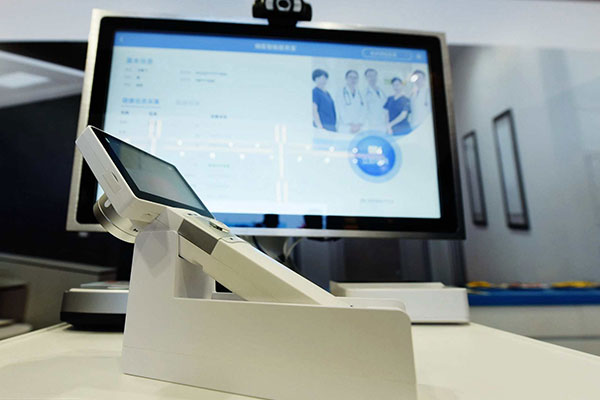
An intelligent device for online medical service in Chengdu, Southwest China’s Sichuan province. [Photo/VCG]
China’s health authority has launched three documents that govern internet medical practices.
The National Health Commission (NHC) released the three documents, which are for trial use, detailing the management of online therapy, internet hospitals and telemedicine. They aim to further regulate online medical diagnosis and treatment, give consideration to the positive role of telemedicine services and improve the efficiency of medical services.
Telemedicine allows medical personnel registered in medical institutes to conduct long-distance consultation and diagnosis via the internet. Online therapy refers to the online return-visit treatment provided by registered medical staff to patients of some common diseases and chronic diseases or contract signing for general practitioner service. And internet hospitals include those set up by medical institutes or independent ones whose services are anchored to brick-and-mortar hospitals.
Who can provide online medical services?
Medical institutes which get the license for practicing are allowed to carry out online medical services, but cannot provide any online diagnosis unapproved by health authorities.
Medical staff to provide online medical services should be registered in the national e-registration systems for physicians and nurses and have their real name e-authenticated. Physicians should have at least three years of independent clinical experience.
No online treatment is allowed for first-visit patients.
Besides, “a province which hasn’t set up a supervision platform for online medical service cannot approve the application for the establishment of an internet hospital,” said Jiao Yahui, deputy chief of medical administration and supervision for the NHC.
All online medical services, like online therapy, telemedicine, staff qualification and information security, should be supervised by the platform, Jiao emphasized.
How can patients benefit?
Jiao cited four benefits for patients.
“First, the patients can get their return-visit treatment to some common diseases via the internet. Second, the doctor can prescribe online and send the medicine to the patients’ home via a third party. Thirdly, the patients are able to sign the general practitioner service online. Fourthly, the internet helps people overcome geographical obstacles. Patients at home get access to high-quality medical resources and enjoy medical services from big cities and experts.”
A strike against traditional hospitals?
“The core of an internet hospital is ‘hospital.’ Internet is the tool,” said Jiao. The current mode aims to integrate the internet technology with traditional hospitals or traditional medical services and bring patients most benefit.
Traditional hospitals can improve their efficiency with the aid of the internet, and also expand their service range. Doctors, at the same time, can optimize their fragmented time to serve patients. “It’s integration and joint development, rather than substitution or overturning,” Jiao added.
“It’s a multi-win situation,” Jiao concluded.
